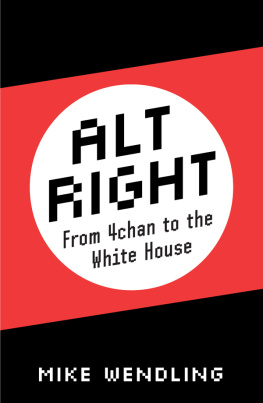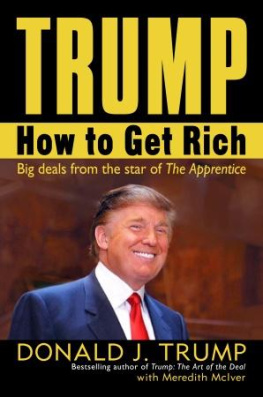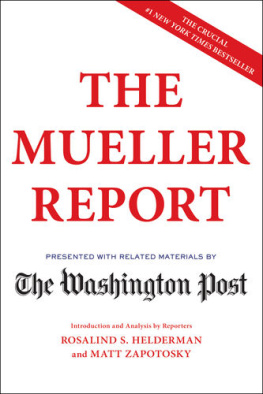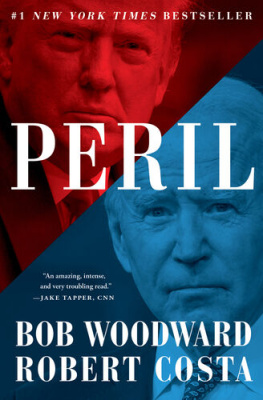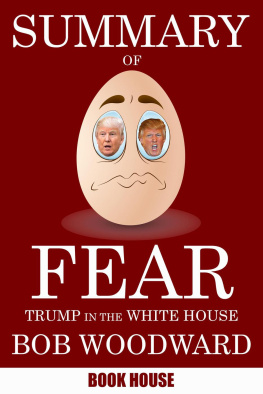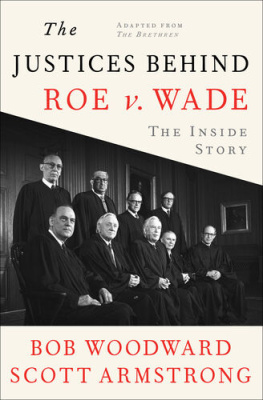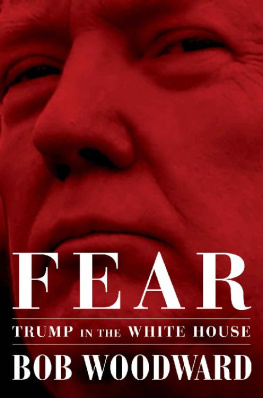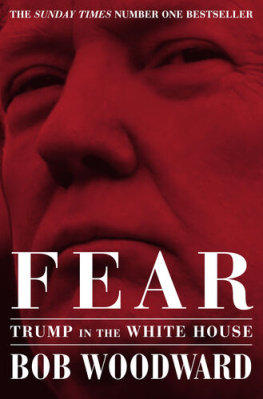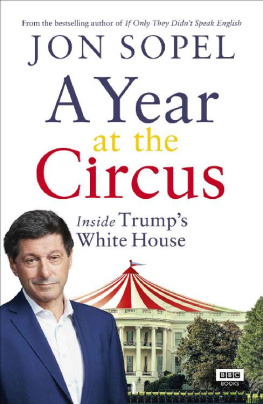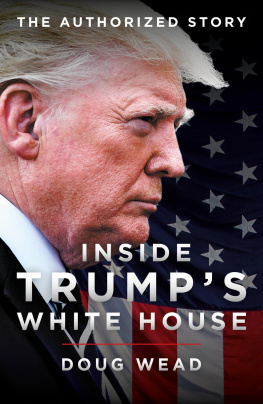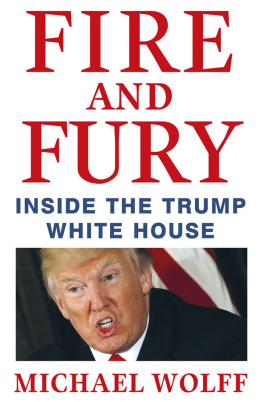Also by
BOB WOODWARD
The Last of the Presidents Men
The Price of Politics
Obamas Wars
The War Within: A Secret White House History, 20062008
State of Denial
The Secret Man ( with a Reporters Assessment by Carl Bernstein )
Plan of Attack
Bush at War
Maestro: Greenspans Fed and the American Boom
Shadow: Five Presidents and the Legacy of Watergate
The Choice
The Agenda: Inside the Clinton White House
The Commanders
Veil: The Secret Wars of the CIA, 19811987
Wired: The Short Life and Fast Times of John Belushi
The Brethren ( with Scott Armstrong )
The Final Days ( with Carl Bernstein )
All the Presidents Men ( with Carl Bernstein )
First published in the United States by Simon & Schuster, Inc, 2018
First published in Great Britain by Simon & Schuster UK Ltd, 2018
A CBS COMPANY
Copyright 2018 by Bob Woodward
This book is copyright under the Berne convention.
No reproduction without permission.
All rights reserved.
The right of Bob Woodward to be identified as the author of this work has been asserted by him in accordance with sections 77 and 78 of the Copyright, Designs and Patents Act, 1988.
Simon & Schuster UK Ltd
1st Floor
222 Grays Inn Road
London WC1X 8HB
www.simonandschuster.co.uk
www.simonandschuster.com.au
www.simonandschuster.co.in
Simon & Schuster Australia, Sydney
Simon & Schuster India, New Delhi
The author and publishers have made all reasonable efforts to contact copyright-holders for permission, and apologise for any omissions or errors in the form of credits given. Corrections may be made to future printings.
A CIP catalogue record for this book is available from the British Library.
ISBN: 978-1-4711-8129-0
Trade paperback ISBN: 978-1-4711-8130-6
Ebook ISBN: 978-1-4711-8131-3
Interior design by Lewelin Polanco
Jacket design by David Litman
Jacket photograph by Brendan Smialowski /AFP/Getty Images
Back jacket photograph by Justin Sullivan/Getty Images
To Elsa
Contents
Authors Personal Note
A heartfelt thanks to Evelyn M. Duffy, my assistant on five books that have covered four presidents. President Trump presents a particular hurdle because of the deep emotions and passions he brings out in supporters and critics. Evelyn immediately grasped that the challenge was to get new information, authenticate it and put it in context while reporting as deeply as possible inside the White House.
Evelyn knew this was history and we had to get as much as possible quickly while memories were fresh and documentation and notes still available. At times we researched, interviewed, transcribed and rewrote sections of the book in a day or two covering foreign policy from North Korea to Afghanistan and the Middle East; and on the full range of domestic issues from trade, immigration and taxes.
She made sure we built the story around specific scenes with specific dates, named participants and accounts of what happened. Evelyn maintains a remarkable work ethic and the deepest sense of fairness, curiosity and honesty. She provided me with thick packets of research, background, chronologies, clips, her insights, a list of major unanswered questions and additional interviews to pursue.
Evelyn brought her endless good sense and wisdom, serving as full collaborator and in the spiritand with the level of effortof a coauthor.
Real power isI dont even want to use the wordfear.
Presidential candidate Donald J. Trump in an interview with Bob Woodward and Robert Costa on March 31, 2016, at the Old Post Office Pavilion, Trump International Hotel, Washington, D.C.
Note to Readers
Interviews for this book were conducted under the journalist ground rule of deep background. This means that all the information could be used but I would not say who provided it. The book is drawn from hundreds of hours of interviews with firsthand participants and witnesses to these events. Nearly all allowed me to tape-record our interviews so the story could be told with more precision. When I have attributed exact quotations, thoughts or conclusions to the participants, that information comes from the person, a colleague with direct knowledge, or from meeting notes, personal diaries, files and government or personal documents.
President Trump declined to be interviewed for this book.
PROLOGUE

I n early September 2017, in the eighth month of the Trump presidency, Gary Cohn, the former president of Goldman Sachs and the presidents top economic adviser in the White House, moved cautiously toward the Resolute Desk in the Oval Office.
In his 27 years at Goldman, Cohn6-foot-3, bald, brash and full of self-confidencehad made billions for his clients and hundreds of millions for himself. He had granted himself walk-in privileges to Trumps Oval Office, and the president had accepted that arrangement.
On the desk was a one-page draft letter from the president addressed to the president of South Korea, terminating the United StatesKorea Free Trade Agreement, known as KORUS.
Cohn was appalled. For months Trump had threatened to withdraw from the agreement, one of the foundations of an economic relationship, a military alliance and, most important, top secret intelligence operations and capabilities.
Under a treaty dating back to the 1950s, the United States stationed 28,500 U.S. troops in the South and operated the most highly classified and sensitive Special Access Programs (SAP), which provided sophisticated Top Secret, codeword intelligence and military capabilities. North Korean ICBM missiles now had the capability to carry a nuclear weapon, perhaps to the American homeland. A missile from North Korea would take 38 minutes to reach Los Angeles.
These programs enabled the United States to detect an ICBM launch in North Korea within seven seconds. The equivalent capability in Alaska took 15 minutesan astonishing time differential.
The ability to detect a launch in seven seconds would give the United States military the time to shoot down a North Korean missile. It is perhaps the most important and most secret operation in the United States government. The American presence in South Korea represents the essence of national security.
Withdrawal from the KORUS trade agreement, which South Korea deemed essential to its economy, could lead to an unraveling of the entire relationship. Cohn could not believe that President Trump would risk losing vital intelligence assets crucial to U.S. national security.
This all stemmed from Trumps fury that the United States had an $18 billion annual trade deficit with South Korea and was spending $3.5 billion a year to keep U.S. troops there.
Despite almost daily reports of chaos and discord in the White House, the public did not know how bad the internal situation actually was. Trump was always shifting, rarely fixed, erratic. He would get in a bad mood, something large or small would infuriate him, and he would say about the KORUS trade agreement, Were withdrawing today.
But now there was the letter, dated September 5, 2017, a potential trigger to a national security catastrophe. Cohn was worried Trump would sign the letter if he saw it.
Cohn removed the letter draft from the Resolute Desk. He placed it in a blue folder marked KEEP.
I stole it off his desk, he later told an associate. I wouldnt let him see it. Hes never going to see that document. Got to protect the country.


